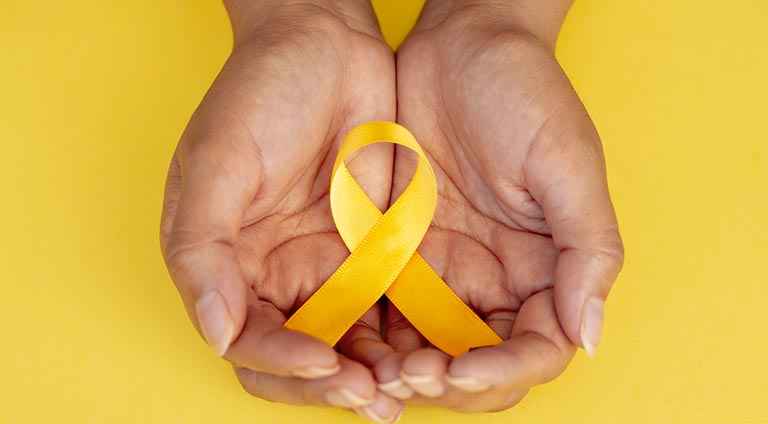Childhood is the most beautiful of all life’s seasons! But not every child is lucky enough to enjoy their childhood care-free. For children fighting the battle of cancer, the young years can be difficult. It is important to remember that early diagnosis and timely medical treatment can help in saving the child and curing them of cancer.
To spread awareness regarding pediatric cancer, promote the benefits of early diagnosis, and raise funds for families dealing with childhood cancer, India observes September as Childhood Cancer Awareness Month.
CHILDHOOD CANCER: UNDERSTANDING THE MENACING PROBLEM
Every year, 300,000 children are diagnosed with cancer. It is 3-4% of total annual cancer cases detected globally. If we consider the Indian statistics, doctors diagnose 40,000-50,000 childhood cancer cases every year. Although 70-90% of pediatric cancers are curable, the estimate suggests that 70% of kids in India die due to:
- Lack of awareness
- Late detection and diagnosis
- Inability to access medical facilities
- High treatment cost
- Unavailability of supportive care.
WHAT TYPES OF GASTROINTESTINAL CANCERS DEVELOP IN CHILDREN?
The most common pediatric cancers are leukemia, brain, and spinal cord tumors, neuroblastoma, retinoblastoma, bone cancer, Wilms tumor, lymphoma, etc. When it comes to gastrointestinal cancer, surgical gastroenterologists often witness hepatoblastoma and pancreatoblastoma in children.
1. HEPATOBLASTOMA: MALIGNANT LIVER CANCER AMONG THE YOUNG
Hepatoblastoma is a type of liver cancer occurring in infants, toddlers, and children. It is a rare type of cancer that often affects children under the age of 3-4 years. GI surgeons have noticed that hepatoblastoma usually does not spread to other parts of the body.
Although the exact cause of the disease is unknown, experts pinpoint genetics. Beckwith-Wiedemann syndrome, familial adenomatous polyposis, glycogen storage diseases, and Aicardi syndrome increase the risk of hepatoblastoma in young children. If a baby is born with low weight, it can affect the risk of developing the disease.
Are there any Symptoms of Hepatoblastoma?
The signs of hepatoblastoma vary depending on the size of the tumor. However, one must look for the following symptoms:
i. Lump/swelling in the belly area
ii. Enlargement of veins in the abdominal area
iii. Pain in the abdomen
iv. Trouble in eating and loss of appetite
v. Fatigue and unexplained weight loss
vi. Nausea and vomiting
vii. Fever
viii. Jaundice
ix. Itchy skin
If you notice any of the symptoms of hepatoblastoma, consult a surgical gastroenterologist immediately. The doctor can diagnose the disease after a physical examination, blood tests, ultrasound, tumor biopsy, CT scan, and MRI scan. The patient may have to undergo liver resection surgery, chemotherapy, and radiation therapy to treat hepatoblastoma. After the treatment, regular follow-ups are crucial.
2. PANCREATOBLASTOMA: RARE PANCREATIC MALIGNANCY IN CHILDREN
Malignant pancreatic tumors are different in children than those seen in adults. Additionally, they have better clinical outcomes in the younger population. Surgical gastroenterologists, oncologists, and other health care providers have noticed pancreatoblastoma almost exclusively in young children (age range: up to 9 years).
Pancreatoblastoma, pancreaticoblastoma, or infantile-type carcinoma of the pancreas is the most common type of pancreatic tumor in younger children. It causes less than 0.2% of pediatric cancer-related deaths in children. It means early detection and early medical treatment can help the child fight the disease successfully.
What are the Symptoms of Pancreatoblastoma?
Although the disease can be asymptomatic, parents and primary caregivers of the child must look for the following signs:
i. Abdominal pain and swelling
ii. Fatigue and lethargy
iii. Anorexia and weight loss
iv. Diarrhea
v. Nausea and vomiting
Predominantly, the male children among the Asian population are affected by pancreatoblastoma. Doctors believe that congenital cases of the disease have some link to Beckwith-Wiedemann syndrome.
The surgical gastroenterologist will recommend tests: sonography, CT scan, MRI scan, etc., to diagnose pancreaticoblastoma. After a successful diagnosis, the young patient may need surgical pancreatic resection to remove the tumor.
TREATMENT, CARE, AND SUPPORT IS NECESSARY
Childhood cancer can affect the young patient physiologically as well as emotionally. With immediate medical treatment, the emotional support of a counselor or support group is essential to help the child and family members.
To fight against the terrible disease, children need to undergo regular medical screening. Additionally, we need more childhood cancer awareness, better medical infrastructure, and improved public health strategies to avoid losing our future generation.
For childhood gastrointestinal cancer treatment in Surat, consult South Gujarat’s best HPB and GI surgeon.





